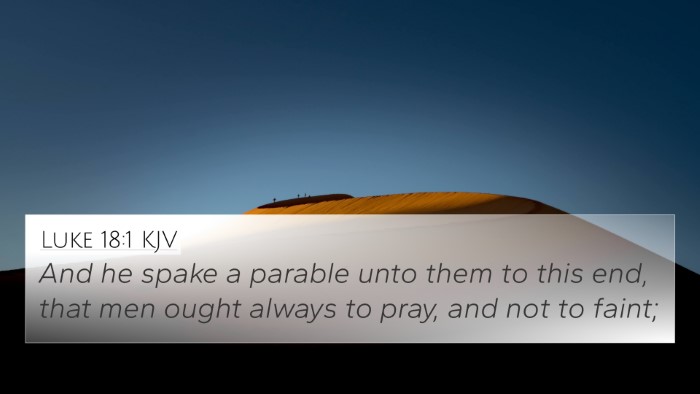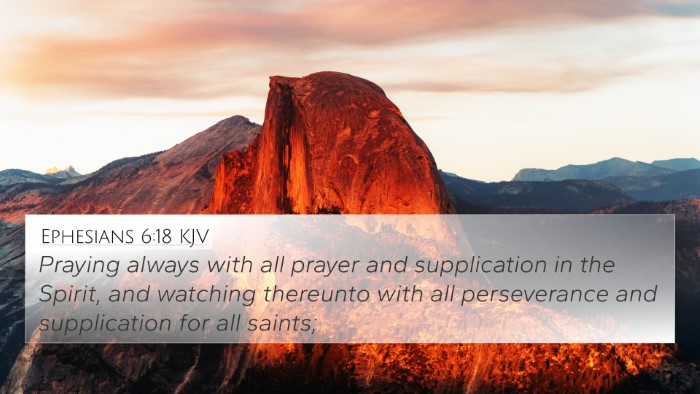Understanding Genesis 18:31
Genesis 18:31 states, "And he said, Behold now, I have taken upon me to speak unto the Lord: Peradventure there shall be twenty found there. And he said, I will not destroy it for twenty's sake." This verse is part of the story of Abraham's intercession for Sodom, where Abraham pleads for the righteous inhabitants in the city. The passage highlights God's mercy and justice while also showcasing the dialogue between God and man, exemplifying the nature of prayer and intercession.
Insight from Public Domain Commentaries
Matthew Henry's Commentary
Matthew Henry notes that in this verse Abraham continues his supplication, demonstrating a profound understanding of God's nature. Henry emphasizes that Abraham's negotiation with God shows a deep sense of responsibility and concern for the righteous. This act of intercession signifies the importance of prayer and the potential for God’s mercy, highlighting that the presence of even a small number of righteous people can lead to divine consideration and protection for others.
Albert Barnes' Commentary
Albert Barnes points out that Abraham's questioning reveals a significant theological principle: God's willingness to withhold judgment out of mercy, should there be righteous individuals present. Barnes discusses how this exchange demonstrates the depth of the human-divine relationship, indicating that God is approachable and cares about the cries of His people. He highlights that God’s answers to Abraham reveal His nature; He is both just and merciful.
Adam Clarke's Commentary
Adam Clarke elaborates on the moral implications of this prayer. He notes that Abraham's request for sparing the city if twenty righteous are found serves as a challenge to conventional notions of justice. Clarke highlights the significance of intercession, as it emphasizes humanity's role in standing before God on behalf of others, and shows how God remains open to dialogue. This interactive faith reveals a relational aspect of God’s sovereignty.
Key Themes and Connections
Genesis 18:31 is pivotal in understanding themes of:
- Intercession: The act of speaking in favor of others before God.
- Divine Mercy: God's willingness to withhold judgment for the sake of the righteous.
- Human Responsibility: The role individuals play in advocating for others.
- The Nature of God: Understanding God as both just and merciful.
- The Power of Prayer: The effectiveness of communicating with God.
Bible Verse Cross-References
This verse is related to several other passages that enrich its meaning:
- Genesis 18:23-26: Abraham's initial appeal to God regarding the number of righteous.
- 2 Peter 2:6: The reference to the destruction of Sodom serves as a cautionary example.
- Lamentations 3:22: Insights into God's mercies being new every morning.
- Matthew 5:6: The Beatitudes, relating to the blessings of those who hunger and thirst for righteousness.
- James 5:16: The power of prayer from a righteous person is effective.
- 1 John 5:16: The importance of praying for those who sin, showing intercessory prayer.
- Ezekiel 18:32: God's desire for the wicked to turn from their ways and live.
Tools for Bible Cross-Referencing
When studying scriptures, it is essential to utilize cross-referencing tools. These include:
- Bible Concordance: A tool that lists words and phrases along with their respective verses.
- Bible Cross-Reference Guide: Helps identify connections between verses.
- Bible Study Software: Applications that provide comprehensive cross-reference capabilities.
- Commentaries: In-depth analyses that provide insights into scripture and cross-references.
- Online Bible Resources: Websites that facilitate easy navigation of Biblical texts.
Conclusion
Genesis 18:31 invites us into a deeper understanding of the character of God through prayer, intercession, and moral responsibility. This interaction between Abraham and God illustrates that God's judgments are tempered by His mercy, and it reveals the potential for righteous individuals to influence God's actions. By engaging with various texts through cross-referencing, believers can deepen their understanding of how scripture dialogues within itself, forming a coherent tapestry of divine revelation.










